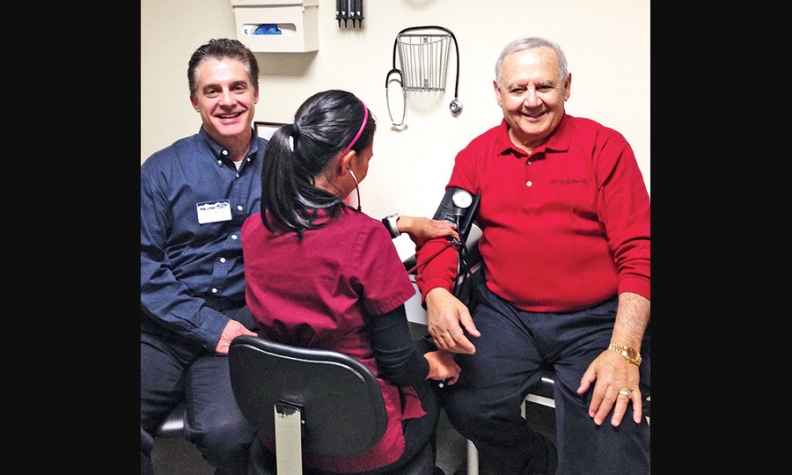Many dealerships offer employees wellness programs such as weight management, access to fitness equipment and assistance with quitting smoking.

Then there's Phil Long Dealerships.
Last summer the dealership group opened a clinic inside Phil Long Ford Motor City in Colorado Springs, Colo. It's staffed part-time by a doctor and a physician assistant and full-time by a registered nurse, and dispenses the same type of medical care rendered by general practitioners and primary care physicians.
The clinic is open to the group's employees and their families who are on the company's health care plan. That covers the majority of the group's nearly 900 employees at its 12 dealerships in Colorado and one in Raton, N.M.
All of that is in addition to the healthy living expertise of Scott Uhalt, who has a doctorate in health promotions and was hired in 2002 as the dealership group's full-time wellness director.
The idea is to keep employees healthy and productive and to help the company, which has been self-insured since 2006, manage its health care costs, says Jay Cimino, Phil Long CEO.
"We hired Scott with the vision that one day we'd be self-insured, and I knew we couldn't be self-insured until we had a wellness program," says Cimino. "He is our wellness guy. We took it one step further and opened our own clinic."
The clinic opened in June, and its use is optional. Employees can use the clinic instead of or in conjunction with a primary care physician. The health care plan also allows for referrals to specialists.
Though it is too soon to know the clinic's impact on the dealership group's health care costs, so far "it's going as we expected, and we are happy with the results," says Uhalt.
It is adjacent to the dealership's fitness center, which was added in 2005 and is equipped with Olympic benches, free weights and other exercise equipment.
The dealership group's clinic is open to all employees; about half work at dealerships located within a half-mile of the Phil Long Ford Motor City store. Uhalt says wellness programs are held at other dealership locations, including distance learning through the computer and telephone consultations.
"We're fine-tuning the clinic concept at Motor City and we're looking to expand the clinic concept to everybody," he adds.
All but X-rays
The clinic offers electrocardiograms, physicals for youngsters involved in high school sports, blood work, sutures to close wounds and flu shots. The clinic also writes prescriptions for generic medicine.
Uhalt (pronounced YOU-halt) says the clinic's staff performs most routine medical tests and procedures, except X-rays.
Phil Long Dealerships ranks No. 87 on the Automotive News list of the top 125 dealership groups in the United States with retail sales of 9,271 new vehicles in 2012.
In June the company made changes to comply with the Affordable Care Act, Uhalt says. For example, it changed its health care plan to avoid a $2,000 per person penalty. The rate increases resulting from the change are being shared by the group's dealerships and employees.
"Until Obamacare, we had not had a premium increase in three years," Uhalt says.
Dollars up in smoke
Employees who use tobacco pay a higher premium for health care than those who don't. But if they join the company's tobacco cessation program, Uhalt helps the employee develop a plan to quit, and the company pays for aids such as nicotine gum and patches.
Of the 150 employees Uhalt has helped, about 80 — or more than 50 percent — have kicked the habit. He says the average quit rate is about 30 percent.
Cimino and Uhalt say they have anecdotal evidence that the dealership group's efforts to keep employees healthy and more productive, and to manage costs, are working.
"We don't need evidence-based research to justify the program," Uhalt says. "It's the right thing to do."
Laws protecting the use and disclosure of individuals' health information make data gathering a difficult task, anyway, he adds.
But about seven years ago there was an analysis of some employees who actively participated in the dealership wellness programs and some who did not. That study found that the medical expenses per person per year for wellness participants were about four times less than expenses per person per year for everybody else.
But Uhalt adds a disclaimer: "People who are well generally join wellness programs."
In the past, Uhalt conducted monthly lunch-and-learn sessions for employees. During the 45-min-ute sessions, employees learned about topics such as diabetes, vascular disease and interacting with physicians.
He says sessions on diet, weight loss and metabolism were the most popular.
"In 2014 we're going to do lunch and learn again," he says, probably at multiple dealership locations. "There is so much misinformation about weight loss."
